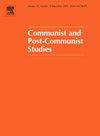Closer to Citizens or Ticking Boxes? Political Parties and Participatory Practices in Hungary
IF 1.3
4区 社会学
Q3 INTERNATIONAL RELATIONS
引用次数: 2
Abstract
Political parties use participatory practices to connect with their members and with the broader electorate. While substantial research indicates how people get involved, very little is known about why political parties use participatory practices. The present article addresses this gap in the literature and seeks to identify the reasons parties do so. We elaborate an analytical framework that includes three main categories of explanations: party characteristics, internal dynamics, and external dynamics. Our analysis focuses on Hungary, explores party statutes and manifestos, and relies on 26 semi-structured interviews with party elites from ten political parties. The findings indicate that parties have several purposes in mind, which vary across parties, that are often linked to broader concerns about citizen engagement and to attempts to give members a voice in internal and external decision-making processes.贴近市民还是打勾?匈牙利的政党和参与性实践
政党利用参与性做法与他们的成员和更广泛的选民建立联系。虽然大量的研究表明人们是如何参与的,但对于政党为什么采用参与性做法却知之甚少。本文解决了文献中的这一差距,并试图找出各方这样做的原因。我们详细阐述了一个分析框架,其中包括三大类解释:政党特征、内部动态和外部动态。我们的分析集中在匈牙利,探讨了政党章程和宣言,并依赖于对来自10个政党的26个政党精英的半结构化采访。调查结果表明,各政党心中有几个目标,这些目标因政党而异,通常与更广泛的公民参与问题有关,并试图在内部和外部决策过程中给予成员发言权。
本文章由计算机程序翻译,如有差异,请以英文原文为准。
求助全文
约1分钟内获得全文
求助全文
来源期刊

Communist and Post-Communist Studies
Multiple-
CiteScore
1.90
自引率
0.00%
发文量
23
期刊介绍:
Communist and Post-Communist Studies is an international journal covering all communist and post-communist states and communist movements, including both their domestic policies and their international relations. It is focused on the analysis of historical as well as current developments in the communist and post-communist world, including ideology, economy and society. It also aims to provide comparative foci on a given subject by inviting comments of a comparative character from scholars specializing in the same subject matter but in different countries.
 求助内容:
求助内容: 应助结果提醒方式:
应助结果提醒方式:


